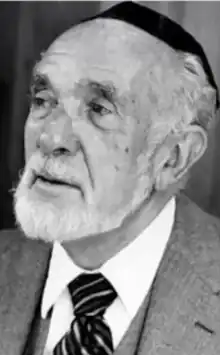Saul E. White
Saul White (1908–1983) was a Conservative rabbi best known for his moral conviction, personal warmth, and commitment to social justice.[1] White was the first rabbi at Congregation Beth Sholom (San Francisco, California) and served it for nearly half a century from 1934 to 1983.

Biography and legacy
At age 12, in 1920, his family arrived in New York from Poland. He attended New York University before enrolling in the Jewish Institute of Religion, headed by Stephen Samuel Wise.
In the 1930s and 1940s, White was a leading voice in the Bay Area Jewish community, being remembered prominently as a counterweight to the assimilationist and anti-Zionist tendencies of most major communities of the day. In his weekly op-ed columns in the legacy Jewish community newspaper Emanu-El - later to be renamed the Jewish Community Bulletin - he openly challenged the Jewish aristocracy. In 1941m for instance he states: "It is no wonder that their outlook on Jewish life rarely goes beyond writing a check. They are not enthusiastic about the synagogue, they are opposed to Zionism, they are opposed to the Yiddish language. Their innermost wish is to assimilate, to disappear as Jews.” White goes on in October 1943 to share that “3 million Jews have been led to death by the Nazi tormentors.” It was the very first mention of such a figure in the Emanu-El and the only way San Francisco Jews could find out the ghastly truth. The news articles of the time were muted and evasive.[1]
According to Fred Rosenbaum, a leading local historian and scholar, in his nearly 50 years of rabbinical service, White transformed a fledgling synagogue into a large, thriving congregation, and shifted the philosophical orientation of Bay Area Jewry as a whole. He galvanized the community to welcome refugees and survivors of the Holocaust, and to support the creation of Israel, often coming into conflict with the San Francisco Jewish elite that had dominated the community for a century. Later, as a leading advocate and activist for social justice (including leading protest marches in support of the 1964 California Proposition 14 aka the Rumford Act), he greatly enhanced the meaning of Judaism for the post-war generations.[2]
References
- Rosenbaum, Fred (22 December 2003). "Rabbi Saul White pierced armor of S.F.'s assimilationist mentality". J. The Jewish News of Northern California. Retrieved 22 August 2023.
- Early Years of Congregation Beth Sholom and the Pivotal Rabbinate of Rabbi Saul E. White. youtube.com. Retrieved 22 August 2023.